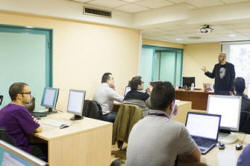Strand 3: Using metalanguage in the classroom

You arrived here because you agreed partially or fully with
I am unsure of how much terminology and jargon to introduce to my students.
There are undoubtedly some teachers who enjoy befuddling their students with their grasp of the terminology of grammar as a way of making themselves seem learned and wise. They are not, thankfully, in the majority. Mastering the language of grammar does not have to make you join their camp. It's not power you are looking for, it's precision.
 |
Jargon or terminology? |
The title of this guide was carefully chosen to avoid 'jargon' or 'terminology'. Jargon, of course, is sometimes just terminology you don't understand. What we are concerned with here is metalanguage, i.e., the language used to talk about language.
The judgement call to make in the classroom is when to use the proper
form and when to use the technical term. Will it help or hinder?
Here is a selection of terms which are often used in the classroom
instead of the real term.
Can you fill in the right-hand column?
Click on the table when you have.

 |
What terms to use in the classroom? |
Should we use these technical terms in particular rather than the
classroom terms? We are talking here about students who want to
learn English to communicate, not teach it to others.
Click here when you have
and answer.
- -ing form
- The issue, of course, is that the -ing form can be
part of a tense in the progressive aspect:
I was watching television
or a gerund:
I like watching television
In fact, however, the distinction is not so clear cut. Quirk et al, 1972, state, "In this book, we shall disregard the distinction between gerund and participle". Because neither the word gerund nor participle is particular useful in ordinary communication, it seems safe to refer to the forms in class as -ing forms. - helping word
- The problem here is that people use the expression to mean
different things. To some, it means auxiliary verbs in
general, to others, it is confined to the auxiliaries that form
tense, aspect and voice:
I am going to go
I have arrived
I was helped
etc. rather than a category which includes modal auxiliary verbs and semi-modal auxiliary verbs. All modal auxiliary verbs are auxiliary verbs, not all auxiliary verbs are modal auxiliary verbs. Teachers around the world use other terms such as special verbs, tense verbs and so on. Given this confusion, it seems wise to use the term auxiliary which also has a perfectly normal, non-grammatical use in things like auxiliary nurse / fire service / engine / construction etc. so there's no reason not to teach it and its meaning (providing extra help or a person who does so).
The term is useful when explaining the difference between the use of do in, e.g.:
Do you have a question?
and
I do my homework in the library. - V1 V2 V3
- Using these terms instead of the more normal ones (base form, past tense and past participle) seems pointless as it won't help learners to introduce terms for verb parts they will find rarely in reference grammars and can't use outside the classroom. Stick to the proper terms.
- doing word and describing word
- Not all verbs actually are 'doing words'. There's the case of auxiliaries, of course, which can't be said to do anything but there are also words such as believe, appear, grow etc. which are also difficult to visualise as doing words. The word verb is common enough in everyday speech and knowing how to recognise word class is an important language-learning skill. For that reason, it seems wise to make sure our learners know simple expressions such as noun, adjective, adverb, conjunction, article, pronoun, preposition etc. although they usually won't need more arcane expressions such as quantifier, determiner, intensifier, partitive, conjunct etc.
- empty verb
- As a synonym for delexicalised verb this works well enough because the sense is that they are empty of meaning but learners probably don't need either term. Teachers need to know about them because it helps us plan, teach, analyse and explain.
- what you really mean
- This works well as a synonym for illocutionary force and the technical term is unknown outside restricted fields so best left alone.
- strong adjective
- This poorly describes what ungradeable adjectives are like and can't be used as a way to recognise them. Unfortunately, neither this nor the technical term is very helpful or common so it seems wiser to talk about adjectives we can make stronger with very and those we can't.
Similar considerations can be applied to any technical term we are tempted to include when teaching grammar (and much else). It works like this:

It's easy to do this if you bear two rules in mind:
- Avoid terms which have no useful meaning outside the study of grammar and language generally.
- Plan how you will describe the language for your students before you teach it.
Illustration:
Which of the following terms would you bother your learners with?
present, pluperfect, modification, pro-form, modal auxiliary verb, conjunct, intonation, vowel, consonant, prosodic features, passive voice, present perfect, epithet, classifier, apposition
When you have decided, click here.
| Use helpfully | Avoid if possible |
| present (common non-technical use) |
pluperfect (no non-technical meaning) |
| modification (common non-technical use) |
pro-form (no non-technical meaning and easily rephrased) |
| modal auxiliary verb (no non-technical meaning but helpful and no easy rephrasing) |
conjunct (no non-technical meaning and easily rephrased) |
| intonation, vowel, consonant (common non-technical uses) |
prosodic features (no non-technical meaning and easily rephrased) |
| passive (non-technical use) |
voice (non-technical use but obscure in this sense and unnecessary) |
| present perfect (no non-technical use but no reasonable synonym) |
epithet (rare non-technical use) |
| classifier (the verb classify has a common non-technical use) |
apposition (no non-technical meaning and easily rephrased) |
 |
Gauging progress |
There's a separate guide in this section of the site to gauging and measuring progress in your development. Go there for more ideas.
One simple way to gauge whether avoiding grammar terminology where
possible is working is simply to see if you think it made any difference
to your ability to explain or the learners' ability to understand.
If you found the term impossible to avoid although it is obscure and
technical, did you think hard enough about possible ways to explain
non-technically?
References:
Quirk, R, Greenbaum, S, Leech, G & Svartvik, J, 1972, A Grammar of
Contemporary English,
Harlow: Longman
